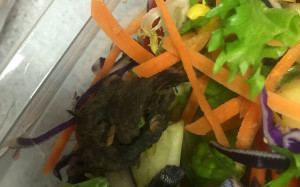Assif Majid of BBC News writes that Watchdog’s reporter was given no training on keeping delivery crates and vans clean.
 The reporter witnessed spillages, but was told by senior drivers that there was no need to clear it up during the delivery round.
The reporter witnessed spillages, but was told by senior drivers that there was no need to clear it up during the delivery round.
Asda says it has a “clean as you go” policy and staff get full training.
Both Asda employees and customers have contacted the consumer programme with allegations about the cleanliness of the store’s delivery crates.
One driver told the programme: “There’s no cleaning process in place. The crates are used over and over again, even after spillages. Most, if not all, are dirty, from food, and things like smashed eggs.”
Another driver told the programme they are so concerned about poor hygiene, they are worried about their own family eating food from the crates.
Asda said the findings were “isolated examples and the opinion of individual colleagues”.
It added: “The findings do not reflect the extensive policies and training they have in place, which are supported by independent third party audits.”
The supermarket also says Watchdog’s researcher did not receive the full role-specific training because he didn’t do enough shifts.
Chartered environmental health practitioner Barrie Trevena said: “Even if the food you’re putting in is wrapped, the packages then become contaminated and then when the customer handles the cans and the packages, then that’s going to contaminate their worktop and fridge.”
The company said it delivered almost half a million orders each week, using their totes more than 2.5 million times, and it was inaccurate and misleading to suggest that it did not have policies or training in place at a business level.
Inconceivable.




 When the Los Angeles Times reported last week
When the Los Angeles Times reported last week